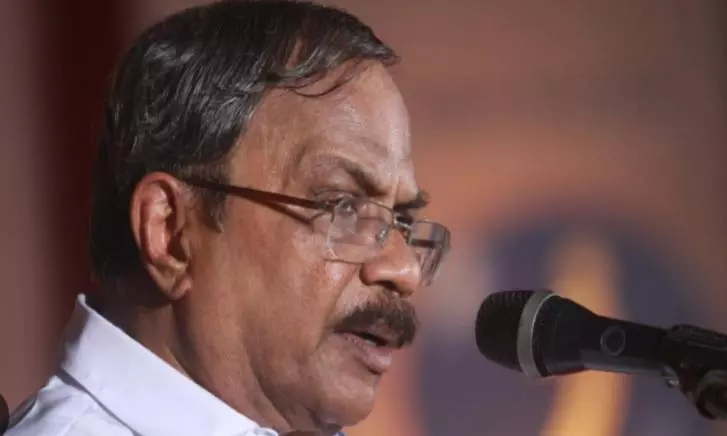
Novels, stories, movies: the enduring legacy of MT
text_fieldsKozhikode: MT Vasudevan Nair who held generations of readers in awe finally disappeared into the mists of time, leaving behind huge legacy perhaps few writers can claim.
What his fans fondly called MT was admitted to a private hospital in Kozhikode on December 15 after he developed respiratory illness.
Since then a steady flow of fellow writers and fans turned up at the hospital asking after his health.
Although known for his engulfing silence and voluble reticence, MT has touched millions, endearing himself to Malayalam.
After he suffered a heart attack, his health began deteriorating and on Wednesday evening at 10 pm, the doctors officially announced his death.
Eventually curtain fell on an eventful life that straddled two centuries replete with numerous social and political changes in Kerala.
MT, who won India’s highest literary award Jnanpith in 1995, received various other accolades including Padma Bhushan, the Kendra Sahitya Akademi Award, Kerala Sahitya Akademi Award, Vayalar Award, Mathrubhumi Award, Odakkuzhal Award, Muttathuvarkey Award, and Padmarajan Award.
Alongside, recognizing his invaluable contributions, Kozhikode University and Mahatma Gandhi University honored him with D.Litt degrees.
Started out as a sub-editor at Mathrubhumi in 1957, MT became the editor of Mathrubhumi weekly in 1968 and helmed it until he resigned in 1981. Later he returned to the publication in 1989 as its Periodicals editor.
After retirement, he served as the president of the Kerala Sahitya Akademi before taking over as the president of the Thunchan Memorial Committee, which he held till his death.
Born on July 15 in 1933 in Koodallure, Ponnani taluk, MT was the youngest of the four children of Punnayoorkulam T. Narayanan Nair and Ammalu Amma.
After primary education at Malamakkavu Elementary School and Kumaranellore High School, he graduated in Chemistry from Victoria College, Palakkad in 1953 and then he was briefly a teacher.
His 1958 novel ‘Nalukettu’ became an instant classic, which delved deep into emotional travails set against the backdrop of decadent and crumbling feudal system.
The novel won him the Kerala Sahitya Akademi Award in 1959, and subsequently there came out other notables including Kaalam, Asuravidhu, Wilapayatra, Manji, and Arabiponnu, co-written with N.P. Muhammad, and Randamoozham.
He also penned some of the rivetingly notable short stories and novellas.
Randamoozham, published in 1984, was written in the perspective of character Bhima in Mahabharata.
His film stint was remarkable as it served as an extension to his glowing literary career, working with more than 50 movies.
He directed a few including Nirmalyam (1973), Bandhanam (1978), Manju (1982), Varikuzhi (1982), Kadavu (1991), and Oru Cherupunchiri (2000).
The movie 'Nirmalyam', which he penned and directed, won him the National Award for Best Film in 1973.























